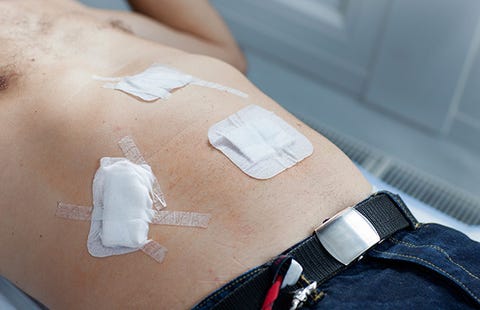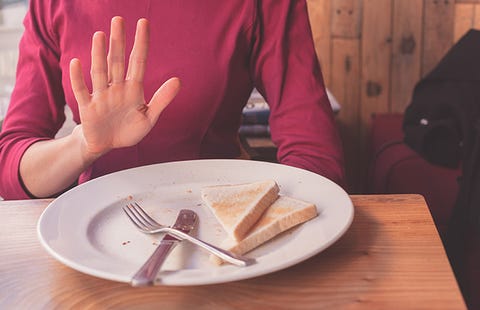how to remove a partition
You probably don't think much about your gallbladder—the organ located in the upper right part of your abdomen that releases fat-digesting bile into your small intestine via bile ducts—until something goes very wrong. Gallstones can block those bile ducts and set off painful "attacks," especially after chowing down on a fatty meal. If you suffer from gallstones, your doc might recommend removing the gallbladder entirely, a procedure that's done on more than 750,000 patients per year in the US.
We wanted to get the scoop on what the experience is really like. You can live without a gallbladder—but should you?
You don't need to worry.
"Gallbladder surgery is one of the most common general surgery procedures in the country, and it's one of the safest surgeries we do," says J. Chris Eagon, MD, an associate professor of surgery at Washington University School of Medicine in St. Louis. The chance you'll have complications is less than 5%, most being non-serious issues like minor bleeding. So take a deep breath and relax—it'll be OK. (It's actually one of the most performed surgeries for Baby Boomers.)
There's not a whole lot of prep work.
Ninety percent of the time, it's elective surgery, meaning a surgeon recommends that you have your gallbladder removed, and you schedule a date to have it taken out, says Eagon. (The other 10% is emergency surgery, and you obviously have no time to prep beforehand.) "Surgeons want you to follow a low-fat diet to avoid severe gallbladder attacks," he says. That's it—there's no bowel prep solution to drink (thank goodness) or meds to take while you wait.
MORE: 6 Weird Signs You're Not Getting Enough Iron
Don't expect a major incision.

bojan fatur/getty images
The majority of gallbladders are removed via laparoscopic surgery, which requires three or four small incisions in your belly, says Tim Pawlik, MD, MPH, PhD, a professor of surgery at Johns Hopkins Medicine. Afterward, docs will put waterproof tape over each, so no need to wait to take a shower.
But your belly button might look weird.
That's because that's where the organ comes out of. Erin Russell, who got her gallbladder out in 2015 at age 30, called it her "Franken belly." "It looked part outie and was bruised yellow," she describes. Happily, it wasn't forever. "Today, it looks totally fine," she says. (Interesting fact: People who have extreme weight loss may be more prone to gallstones.)
You won't fit into your pants.
Author John Gilstrap wrote about his experience with the surgery (find his essay here). The biggest advice he has is to bring pants that are three sizes too big for your trip home from the hospital. "Between the fluids they pumped into me to keep me alive, and the air they pumped into me to get the job done, I was way thicker around the middle than my normal pants could handle. In the first day I was home, I literally peed away 6 pounds," he says.
Yep, they inflate your belly.
That air they pump into your abdomen is CO2. And one weird side effect? Lingering shoulder pain for 24 to 48 hours. "CO2 may cause diaphragm irritation, and people feel this in their shoulder," says Eagon. Luckily, walking around post-surgery breaks up these gas bubbles, and discomfort disappears. (Gas pains are also an initial sign of gallstones.)
You'll wake up out of it.

IAN HOOTON/SPL/getty images
Coming out of anesthesia, you'll be groggy, of course. But "even immediately after surgery, I could tell I was better," says Russell. Gilstrap found the exact same thing. "At no point did the worst surgery-related discomfort come to within 10% of the discomfort of a gallbladder attack," he says.
MORE: 9 Weird Reasons Your Gums Are Bleeding
You might go home that day.
You'll need to be put under general anesthesia, and the procedure takes about 45 minutes to 1 hour. Most patients can leave a few hours after surgery, though some might spend one night.
You'll want to schedule surgery for the end of the week.
You can go back to work (and drive there yourself!) in 3 to 5 days, so if you plan for a Thursday or Friday, you might be able to head back to the office on Monday. While you're recovering, you'll need a loving family member or friend to help you out. Don't be a hero and try to do everything yourself.
Listen to your body.
As for resuming normal activities like exercise, go ahead and do what you'd like as long as you feel comfortable, says Pawlik. Russell admits she overestimated how ready her body was for things. "I was so surprised how easily I would tire while recovering. Walking to my mailbox would leave me exhausted," she says. "It was hard for me to process that things that were previously easy to do would be difficult for a while."
MORE: 7 Reasons You're Tired All The Time
Going No. 2 might be…strange.
Without a gallbladder, bile still makes its way into your small intestine, but the mixture might be different, says Eagon. So if you eat a high-fat meal, your poop might be a bit looser—and this may be the case for life. Luckily, your digestion will probably return to normal, but some people find they can no longer tolerate some foods. For Russell, that's vegetable oils and almond butter. Gilstrap says he's still sensitive to certain high-fat foods. "I can have bread and butter or a cheeseburger without a problem, but if I want to binge on KFC, I know I need to stick close to a bathroom," he admits.
Your appetite may change.

lolostock/getty images
"I still get hungry and have plenty of cravings, but I feel satiated more quickly than I used to," says Henry Lee, a Trumbull, CT, resident who had surgery 4 years ago when he was 37. "I find that I can eat almost anything without much trouble—even pizza and beer—but fried foods will always cause some discomfort," he says. Now, if he eats something heavy or fried, he makes sure he eats lighter meals before and after.
MORE: 8 Things That Happen When You Finally Stop Drinking Diet Soda
You won't miss it.
You'll have no clue you're sans gallbladder, says Pawlik. So don't expect any phantom pains (like some people report when they get an arm or leg removed). Russell was shocked at how easy the process was. "I just couldn't believe how removing an organ was not really that big of a deal. I can function perfectly fine without it."
Gilstrap had a similar experience: "For me, the biggest worries prior to surgery were the possible complications. The Internet shows only horror stories. The reality was, I went to sleep, I woke up, and all was well."
Jessica Migala Jessica Migala is a health writer specializing in general wellness, fitness, nutrition, and skincare, with work published in Women's Health, Glamour, Health, Men's Health, and more.
This content is created and maintained by a third party, and imported onto this page to help users provide their email addresses. You may be able to find more information about this and similar content at piano.io
how to remove a partition
Source: https://www.prevention.com/health/a20496399/gallbladder-removal/
Posted by: wagnerimme1941.blogspot.com

0 Response to "how to remove a partition"
Post a Comment